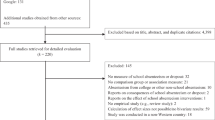Abstract
Pre-school children with special needs face a complex transition to school, requiring additional administrative, social and educational support. In this study, parents of 40 children with special needs reported on the transition to school experience of their 4–6-year-old child. They completed a measure of impact of the child’s disability on their family and an assessment of the quality of services experienced. Individual, semi-structured interviews contextualized these evaluations. Twenty children (pre-transition) were in preschool; 20 had already started school (post). Post-transition parents reported less average disability impact on family, generally lower perception of quality of care than pre-transition ones, and long waiting periods for school-based support. Most parents, however, reported satisfactory linkages between prior-to-school services and school. In conclusion, this study demonstrates that, despite the current climate of support for early child development, barriers for satisfactory transition to school still exist, and are largely due to low effectiveness of existing policies.
Similar content being viewed by others
References
Duncan, N. (2003). Awkward customers? Parents and provision for special educational needs. Disability and Society, 18, 341–356.
Early, D. (2004). Services and programs that influence young children’s school transitions. In R. E.Tremblay, R. Barr, & R. Peters (Eds.), Encyclopedia on early childhood development (online). Montreal: Centre of Excellence for Early Childhood Development (pp. 1–5). Available at: http://www.excellence-earlychildhood.ca/documents/EarlyANG.pdf. Accessed 01/15/07
Fowler, S. A., Schwartz, I., & Atwater, J. (1991). Perspectives on the transition from preschool to kindergarten for children with disabilities and their families. Exceptional Child, 58, 136–145.
Human Resources Development Canada (2003). Disability in Canada: A 2001 profile. Ottawa: Government of Canada.
Janus, M. (2004). Voices from the field––Transition to school practices: The need for evidence. In R. E.Tremblay, R. G. Barr, & R. D. Peters (Eds.), (pp. 1–4). Montreal: Centre of Excellence for Early Chldhood Development. Available at: http://www.excellence-earlychildhood.ca/documents/JanusANG.pdf. Accessed 01/15/07
Janus, M., Cameron, R., Lefort, J., & Kopechanski, L. (2007). Starting kindergarten: What do we know about issues affecting the transition to school for children with special needs? Canadian Journal of Education, 30, 628–648.
Kazak, A. E., & Marvin, R. (1984). Differences, difficulties, and adaptation: Stress and social networks in families with a handicapped child. Family Relations: Journal of Applied Family & Child Studies, 33, 67–77.
King, G., Kertoy, M., King, S., Law, M., Rosenbaum, P., & Hurley, P. (2003). A measure of parents’ and service providers’ beliefs about participation in family-centered services. Children’s Health Care, 32, 191–124.
Ministry of Education (2000). Standards for school board’s special education plans. ISBN-0–7794–0097–6 Government of Ontario. Toronto: ON Queen’s Printer for Ontario.
National Center for Health Statistics (2006). Health, United States 2006, With Chartbook on Trends in the Health of Americans (Rep. No. Library of Congress Catalog Number 76–641496). Hyattsville: U.S. Government Printing Office.
Ray, L. D. (2003). The social and political conditions that shape special-needs parenting. Journal of Family Nursing, 9, 281–304.
Rous, B., Hemmeter, M. L., & Schuster, J. W. (1994). Sequenced transition to education in the public schools: A systems approach to transition planning. Topics in Early Childhood Special Education, 14, 374–393.
Shotts, C. K., Rosenkoetter, S. E., Streufert, C. A., & Rosenkoetter, L. I. (1994). Transition policy and issues: A view from the states. Topics in Early Childhood Special Education, 14, 395–411.
Sparrow, S., Balla, D., & Cicchetti, D. (1984). Vineland adaptive behaviour scales (survey form). Circle Pines, MN: American Guidance Service.
Stein, R. E. K., & Jessop, D. J. (2003). The impact on family scale revisited: Further psychometric data. Developmental and Behavioral Pediatrics, 24, 9–16.
Valeo, A. (2003). Special education tribunals in Ontario. International Journal of Special Education, 18, 18–30.
Wolery, M. (1999). Children with disabilities in early elementary school. In R. C. Pianta & M. J. Cox (Eds.), The transition to kindergarten (pp. 253–280). Baltimore: Paul H. Brookes.
Author information
Authors and Affiliations
Corresponding author
Rights and permissions
About this article
Cite this article
Janus, M., Kopechanski, L., Cameron, R. et al. In Transition: Experiences of Parents of Children with Special Needs at School Entry. Early Childhood Educ J 35, 479–485 (2008). https://doi.org/10.1007/s10643-007-0217-0
Received:
Accepted:
Published:
Issue Date:
DOI: https://doi.org/10.1007/s10643-007-0217-0



